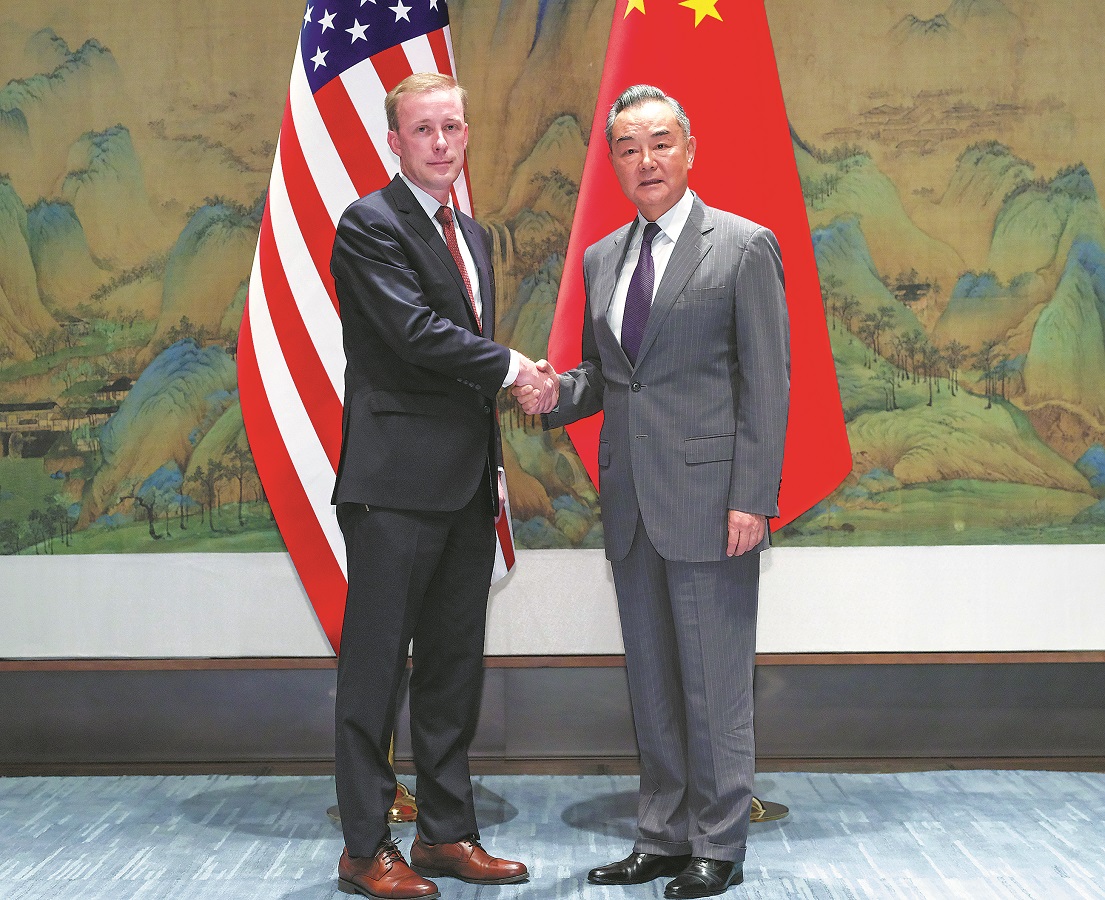(Source:China Daily,2024-08-28)

Wang Yi, a member of the Political Bureau of the Communist Party of China Central Committee and director of the Office of the Central Foreign Affairs Commission, shakes hands with US National Security Advisor Jake Sullivan, during their talks in Beijing on Tuesday. DING LIN/XINHUA
Shortly after United States National Security Advisor Jake Sullivan arrived in Beijing on Tuesday afternoon, he embarked on a new round of China-US strategic communication with Chinese Foreign Minister Wang Yi.
In his opening remarks at the talks, Wang expressed his expectations for the two days of in-depth communication.
He expressed hope that China-US relations would move in the direction of overcoming disturbances and removing obstacles, and "truly realize stable, healthy and sustainable development".
Wang noted that the relationship is "vital to both countries and affects the world" and that "the past few years have been full of ups and downs".
Sullivan thanked China for its thoughtful arrangements for his first China visit as national security adviser. He said that US President Joe Biden is committed to managing the US-China relationship responsibly, avoiding competition from veering into conflict, and cooperating in areas of common interest.
Washington looks forward to having a fruitful dialogue with Beijing on a wide range of topics through this strategic communication and implementing the consensus reached by the two heads of state, said Sullivan.
Wang, who is also a member of the Political Bureau of the Communist Party of China Central Committee and director of the Office of the Central Foreign Affairs Commission, previously held three rounds of strategic communications with Sullivan in Austria, Malta and Thailand.
The strategic communications between Wang and Sullivan are part of the consensus reached at the summit between President Xi Jinping and US President Joe Biden in Bali, Indonesia, in 2022.
When disembarking his plane at Beijing Capital International Airport on Tuesday afternoon, Sullivan was welcomed by Yang Tao, director of the Foreign Ministry's Department of North American and Oceanian Affairs, who is also a veteran diplomat in handling US affairs. US Ambassador to China Nicholas Burns also greeted Sullivan there.
Sullivan's three-day trip, till Thursday, also marks the first visit to China by a US national security adviser since Susan Rice's trip in 2016.
Speaking to Sullivan, Wang mentioned that under the strategic guidance of President Xi and President Biden, the two sides realized the Bali summit and the San Francisco summit in November.
"The experience therein is worth drawing on, lessons need to be learned, and the key is to pivot to the major direction of mutual respect, peaceful coexistence and win-win cooperation," Wang said, adding that implementing the consensus of the San Francisco summit "is the shared duty of China and the US, as well as the main task of this strategic communication".
Teng Jianqun, professor and director of the Diplomacy Studies Center at Hunan Normal University in Changsha, said, "Since the two leaders' summit last year, the two sides have seen a recovery in cooperation in areas such as politics, the economy, diplomacy and security."
Teng noted that Sullivan is a key policy assistant to the Biden administration, and his ongoing trip undertakes a series of important missions.
"Sullivan's China trip aims to keep afloat the good momentum of China-US interactions," he said.
Wu Xinbo, dean of Fudan University's Institute of International Studies, noted that China-US relations are still plagued by constant friction because the US suppresses China in the areas of trade and commerce, as well as science and technology, and it keeps targeting Chinese companies.
"Sullivan's visit to China also provides an opportunity for both sides to discuss pressing concerns and manage differences," he said.
In a recent video speech for the Second Fudan-Harvard China-US Youth Leaders Dialogue, Jing Quan, minister of the Chinese embassy in the US, noted the progress in bilateral cooperation in fields such as counternarcotics, people-to-people exchanges, the economy and trade.
"Over the past 45 years, the China-US relationship has kept forging ahead despite twists and turns, growing into the most important bilateral relationship in the world today," he said.



